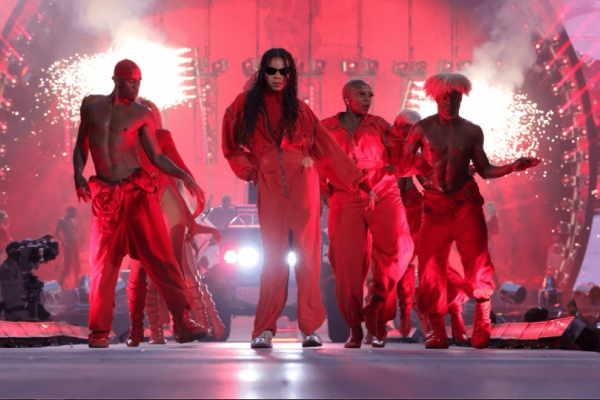Danny McBride’s HBO show The Righteous Gemstones is a dark comedy about corrupt, hyper-wealthy Christian pastors. The Gemstone family runs a famously successful megachurch in South Carolina, but behind the scenes, they evade taxes, snort cocaine, pull knives on their friends, bicker like filthy-mouthed children, and say things like, “You are forgiven for my suspicions of you.” And though they all live in mansions on the same compound, patriarch Eli Gemstone and his three adult children — Jesse, Judy, and Kelvin — generally only come together in spirit when they need to ward off blackmailers, snoops, and evil grifters from their past: anyone who might reveal their secrets or jeopardize the family’s wealth-hoarding.
Though outlandish, the show rings true in a world where there is no shortage of scandal among megachurch pastors and celebrity Christians: from Carl Lentz to Marc Driscoll to Jerry Falwell, Jr., who, in a recent Vanity Fair article, admitted to not being religious, though he served as president for the evangelical Liberty University. In the same article, journalist Gabriel Sherman even references the Gemstones: “Falwell resigned from Liberty in the wake of a sensational tabloid scandal that could have been dreamed up in the writers’ room of The Righteous Gemstones.”
Gemstones is now in its second season, but it is still unclear to me whether the Gemstones, like Falwell, consciously live according to their selfish interest or whether they simply cannot grasp the depth of their own hypocrisy. Usually, it seems to be the latter. “Look, y’all, I’ve been very fortunate in this world to be born a Gemstone. I mean, it’s about as close to God as one can get,” says Jesse (played by McBride), in one of his more self-aware moments. “But today I stand before you as just a man, just like these other flawed men in this room. I’m very sorry to say that these flawed men and myself have participated in some sinful, illicit activities.” After airing his and his friends’ dirty secrets in front of their wives, Jesse says, “Let’s look at the bright side, guys! No one else in this room f***ed a prostitute except for Chad … everybody here was pure of heart and chose not to … This is where the truth sets us free!”
When my best friend introduced me to the show, she said, “It has Newspring written all over it.” Newspring is the South Carolina megachurch we visited together as teenagers. My friend remembers the pastor harping on the idea that our sin is like a “tampon” to God — as though no word or concept could be nastier than a woman’s bodily functions. I remember the same pastor saying hammily, “Animals don’t have souls. Your dog’s not going to heaven, and your cat’s going to hell.” His seemed to be a Christianity like Marc Driscoll’s: a Christianity in which Jesus is a chauvinist, and callousness is considered funny and strong. I was repulsed not just at what he said, but by his power to fill a stadium with people who would hang on his every stupid word.
Some of the show’s power lies in the very subtle ways it asks: How do they get away with it? Why do buffoons like the Gemstones hold such power over the masses — and over us? In part, the answer is that we have fallen prey to the backwards notion that wealth is a sign of divine favor and that God might have a plan to bless us, too, with a yacht and a fleet of private planes. (I remember the same Newspring pastor urging people to give a full 10 percent of their income to his church, saying that God returns tithes with greater financial blessing. As “evidence,” he said smugly that he had just taken his wife to Saint Lucia.)
But the other part of the answer seems to lie in what the Gemstones get right. Like Hamlet’s asinine Polonius who managed the line, “to thine own self be true,” the Gemstones occasionally happen on some real wisdom. Jesse preaches a provocative Easter sermon on the suffering of Judas. In another episode, Eli preaches, “By accepting one another for our shortcomings, our sins, our selfish behavior, we are granted the ability to make mistakes as well. That’s what [God] gives us: the ability to begin again.” More than any others, I find those words to be a helpful and practical rephrasing of Jesus’ prayer: “Forgive us our debts, as we forgive our debtors.” As my father-in-law says, even a broken clock is right twice a day.
Of course, the humor in The Righteous Gemstones comes from what the characters get wrong. The family’s foolish antics are underscored by the presence of Jesse’s oldest son: gentle, thoughtful Gideon, who is as out of place in the Gemstone family as Lisa Simpson is in hers. Gideon (Skyler Gisondo) is a quiet character, but the looks that cross his face reveal just as much as his father’s petulant verbal diarrhea.
In an early episode, Gideon comes back home after running away to Los Angeles. Or, as Jesse puts it: “Motherf***er waltzes in here like he’s the damn prodigal son … who does that? A sociopath who only cares about himself, that’s who.” Gideon’s return is a clear relief to the whole family except for Jesse, whose ego is still wounded from his leaving, and who can’t stand for Gideon to be the center of attention.
But when Jesse fully understands why Gideon left for LA, and why he has come back — he (grudgingly, slowly) takes some responsibility for his behavior, forgives Gideon for some actual wrong-doing, and does what is necessary to restore his relationship with his son. I sobbed through one of these scenes, in part, because it caught me so off-guard, and in part because it was just so dang sweet.
In its second season, the show’s writing seems to have fallen prey to the old sitcom trope: Status quo is king. Jesse and his siblings have relapsed on the modest moral progress they made in the first season. And while Gideon has been embraced back into the fold, it is clear his family still expects him to conform rather than be his own person.
By decentering Gideon’s character, the show has lost its moral compass, and the plot — though full of conflict and mystery — has come to seem less urgent. Why have a story about bad people being bad, if they’re not going to change and show us how to do the same? I want to see the Gemstones lose the world and gain their souls.
I will stay with The Righteous Gemstones to the end, no matter how the plot unfolds. For me, the main draw of the show has never been the subject matter, the storyline, or even character development. All those things seem to simply serve as vehicles for McBride’s absurd humor and dramatic flair.
The show, I think, is ultimately about the strange and funny things its characters say, and how the actors deliver them. Days after an episode airs, you may find me still mumbling favorite lines under my breath, trying to capture the actors’ cadence and inflection. As a South Carolina native, I’ve never felt so in love with my dialect, or seen myself so delightfully represented on-screen. The stereotype is that Southerners talk slow. But sometimes we talk fast, as Jesse’s Uncle Baby Billy (Walton Goggins) does when he says, “Now, I’m emotionally fragile and conflict will f*** with my sleep,” slurring his words together so that “emotionally” and “fragile” somehow seem to rhyme. Other times, we do talk slowly, and if the words don’t come out with the punch we intended, we might rephrase them until we get it right. Again, Uncle Baby Billy (who is, by the way, full-grown): “You came off terrible. Just sweatin’ like James Brown onstage at the Apollo … Sweaty ol’ Eli up there. Sweatin’ like a little ol’ pig.”
Of course, McBride saves the best lines for himself. In one scene, Jesse looks up from his marimba — which he has been tinkering at with the skills of a toddler — and says in a reflective tone, “Music has always soothed my vicious temper.” Sure, some of the humor lies in how he says it. But I don’t think anyone’s ever written a better piece of dialogue.
Got something to say about what you're reading? We value your feedback!







